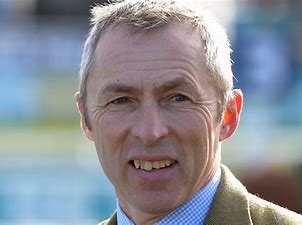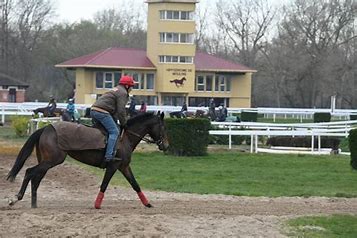 A second training career for veteran Nick Littmoden A second training career for veteran Nick Littmoden ick Littmoden, formerly training in Newmarket's Hamilton Road, took his whole enterprise, lock, stock and barrel, to France in March, where he trains at the training centre on Hippodrome de Moulins-les-Metz, in Alliers, central France. He's one of a growing band of British trainers frustrated at the poor returns and either moving or running satellite yards on the other side of la Manche. Moulins is a thriving training centre in which the local société and mairie has recently invested over €1m in new facilities to accommodate the 130 or so horses in training there. Nick is one of three trainers on the site, which also include some 70 trained by Augustin Boisbrunet, one of France's leading Jumps trainers. Nevertheless, it doesn't explain eschewing the uniquely brilliant facilities and centre of excellence that is Newmarket for a different territory where both the culture and language represent obstacles to incomers. So why does the trainer of over 600 winners on the Flat and over Jumps with big wins in the Windsor Castle and Flying Childers find it necessary to start afresh in a foreign country? I caught up with Nick in a call this week to explore. So Nick, the first question I suppose has to be why? It appeared you'd been a successful trainer over here. What changed? I'd trained successfully for many years, latterly on the Hamilton Road, but I took a break when the problems associated with running a yard of 80-100 horses made the job a chore. My family moved out to Norfolk, where I enjoyed developing a breaking yard, but I was spending as much time delivering horses back to trainers in Newmarket whose methods I considered inferior to my own that I rented a yard in Newmarket with a handful, continuing to commute from Norfolk each day. It was impinging on family life and we (Nick and wife Emma) had often considered abroad, so we set about searching. I didn't want to repeat the mistakes of growing a large yard in the UK a second time, and other areas of the UK didn't appeal. Why the Auvergne? I'd been asked to train abroad a few times previously, but the timing hadn't been right. Emma and I found a property on the web but because of Covid travel restrictions, we were unable to visit. Peter Jones, who'd bought horses for me regularly in the past checked out the property for us, and told us its equine credentials were perfect. We are in an agricultural area, but also surrounded by other horsemen: Emmanuel Clayeux is about 20 minutes distant, and we are within a few hours of virtually every track in France. So you're not just based at the racetrack? No, I actually run two yards. The racing yard is based on the training centre at the racecourse, where we have around 15 horses in training. Back at home, we own a 30 acre site with an 800m round gallop with a spur to extend its length, a horsewalker and equine pool, as well as numerous turnout paddocks. It's always been alien to me to keep horses in all the time given they are ruminant animals. Moulins Racecourse has everything one could possibly need to train horses, nor is it crowded. The recent investment has made it very viable. Did your owners and staff come over with you? Some of my owners did follow me to France, but interestingly, I've picked up a few French owners since arriving here. One is a breeder, another an accountant. I guess my early success here helped oil the wheels a little. We're not promoting ourselves other than through Facebook at the moment. As to staff, some staff helped me settle the horses in, but work permits are no longer straightforward since Brexit, so they largely returned. I employ 4 French lads full time to support the business. What are the obstacles to training in France? For starters, the language is a major impediment, but not one that cannot be overcome. I relish the challenge of learning a language on my daily commute into Moulins each morning! There are issues around winning your residency permit which have been made easier by the fact that I am growing a business employing local labour. But for any trainer already licensed in the UK or Ireland, a BHA or HRI licence will provide a 3 month temporary authorization (this is what the likes of Tom George has been using). What is the process of getting to train in France? You need to demonstrate sufficient experience as a trainer already in another jurisdiction, or take the equine trainers induction course, which lasts 6 weeks and is comparable to what happens in the UK. You also have to get an acceptable grade in the TCF (teste de connaissance de langue française), a language test to allow you to integrate into your chosen community. And like in the UK, you have to illustrate a business plan to France Galop and financial stability. For anyone thinking of copying you, what are the advantages of the French model? Put simply, the overheads of training in the UK are a major disincentive. The sale of our property in Norfolk allowed us to buy a larger, more desirable property in the Auvergne, where the costs of property are much lower. Add to that lower training costs. For example, gallop fees to use the training centre at Dragey are just €45 per horse per month. So overall, my costs are much lower. Add to that better returns from running horses and a generous annual travel allowance (a "prime"), means I don't have to train 100 horses to make a living. I wouldn't train again in the UK, I'm afraid. The prize money does vary between courses depending on whether they are running Tiercé races tapping into national and international betting pools or not. The idea of two-tier racing is not viewed here with the same horror as in the UK, and even a modest bumper winner can win €5,000. How is the family fitting in? They've embraced the move whole-heartedly and I wouldn't have done it without their buy-in. Emma was right behind it from the off, whilst my daughter Grace (13), is now riding work and enjoying her new school. They've sensibly dropped her a school year to allow her to catch up on the language, but she'll be fluent long before I am! Everyone has been very friendly, and helpful. The positive results of the move are there to see. So far, from a move in March, 8 winners have resulted from 35 runners, generating 5 individual winners and gross win & place prize money of €106,863. It would appear the Littmoden skills haven't lost their shine by crossing la Manche. Comments are closed.
Northaw Racing NewsWelcome to the News page. Here you will find the very latest information about Northaw Races and race course conditions
If you'd like to submit content to this site, please email here for details Archives
May 2024
Categories |



 RSS Feed
RSS Feed